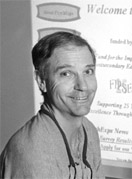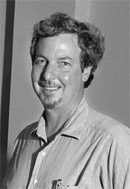 When Dr. David Rock joined the UM faculty in the School of Education in fall 1998, he brought with him a lot of problems specifically, four a week.
When Dr. David Rock joined the UM faculty in the School of Education in fall 1998, he brought with him a lot of problems specifically, four a week.
 When Dr. David Rock joined the UM faculty in the School of Education in fall 1998, he brought with him a lot of problems specifically, four a week.
When Dr. David Rock joined the UM faculty in the School of Education in fall 1998, he brought with him a lot of problems specifically, four a week.
He posts them on a website for the world to see. And the world has seen them. Rock’s mathematical Problem of the Week Contests are viewed by thousands of students each week. The site (www.olemiss.edu/mathed/ problem.htm) receives 700-1,000 e-mail solutions per day, sent by solvers and would-be solvers from more than 1,500 cities in 75 different countries and all 50 states. Begun three years ago almost as a hunch, the site led to Rock’s dissertation and continues to suggest research ideas as well as to sustain a working relationship with Casio Inc. and a collaboration with the University of Central Florida.
The structure of the site is relatively straightforward: There are six individual mathematical problem-solving contests (two are handled by UCF), each with its own identity, content, and grade-level expectations. Students tackle the problem, and click an e-mail hot-link to send their solutions. A return message is sent indicating whether the response was correct or incorrect.
To inspire and then tap into enthusiasm for the task, Rock added what he calls “the carrot.” When a student sends a correct answer, the student’s name and school address are listed on the contest site directly below the problem, in the order in which correct answers were received. Rock says that, given the timing, it’s obvious that some people wait beside their computers on Monday morning, punching “reload” until the problem has been posted, hoping to be the first to send in the correct answer and see their names at the top of the list.
In addition, each week the name of one solver at each site is selected at random from among all correct answers, and those students receive Casio calculators. Casio has been a generous supporter of the project from the beginning, Rock says. “They’ve been wonderful, and the calculator is a great carrot to dangle.”
The collaboration with the University of Central Florida is also mutually satisfying. Rock mentions as one benefit the fact that his students at UM working on the project routinely communicate with the UCF students, as he does with his faculty counterpart.
In addition, he says having a partner essentially doubles the resources either institution can call on. One further benefit is that having an institutional partner provides a sort of “competitive nudge.” Having another organization involved, Rock says, keeps you sharp, although the joint partnership is certainly more a collaboration than a competition.
Recently, Rock and Dr. Jean Shaw, also of the UM School of Education, conducted a spinoff from the contests. They posted a simple survey, asking questions like “What is a mathematician?” and “What tools does a mathematician use?” Some of the answers were astute (one of the top responses for “what tools?” was “brain”), but Rock and Shaw found students were very vague about what mathematicians actually do. They are in the process of publishing their findings.
If you are interested in using the Internet for a similar contest, please contact Rock via e-mail at rockd@olemiss.edu. The structure of the site, both the use of problems and the offering of “carrots,” is adaptable and could be applied in a range of disciplines but he has one caution. “If you’re going to do something involving interaction with hundreds of people a day, you’d better make the commitment,” Rock says. His own enthusiasm for this use of the web is boundless. “This is my baby."

 Since fall '98, a website created by two UM researchers has been demonstrating how the Internet can be used to generate, transmit, and archive data, and then make the data available to the global community. In fact, their website does all of the above, and does it at a level accessible to teachers, scientists, and students.
Since fall '98, a website created by two UM researchers has been demonstrating how the Internet can be used to generate, transmit, and archive data, and then make the data available to the global community. In fact, their website does all of the above, and does it at a level accessible to teachers, scientists, and students.
Dr. Ken McGraw, Department of Psychology, and Dr. Mark Tew, Department of Electrical Engineering, began their work together several years ago, largely out of frustration with the limitations imposed by commercial software packages for laboratory classes. A cognitive psychologist, McGraw knew the changes he wanted to make for experiments in his lab classes, but, without access to the code to modify the software, he was unable to augment or tailor them in any way.
Enter Tew, a primary instructor in the summer Faculty Technology Development Center workshops, whose focus was on helping UM faculty use multimedia tools for classroom and laboratory instruction. Together, they created prototype applications that met the needs of cognitive psychology labs, and discovered that anything they were able to do locally, they could do globally via the web, and so could others, in a huge variety of settings and for an unlimited number of applications.
The McGraw/Tew collaboration led to a three-year Department of Education FIPSE grant (Fund for the Improvement of Secondary Education) in 1997, one of just 70 awarded that year. PsychExps, the website that resulted (http://www.olemiss.edu/projects/PsychExps), became fully operational in fall ’98.
The technology that makes this site possible includes Authorware, a relatively easy-to-learn multimedia authoring tool, and Shockwave, a free technology that makes interactive Authorware programs deliverable over the Internet to both PC and Mac users. Together, the programs make it possible for cognitive psychologists and teachers to design experiments, put them on the web, run them, and once the data are transmitted back to the server at UM download the data for analysis.
Unlike web experiments that use word-based, survey-like responses, the McGraw/Tew approach is genuinely interactive: Subjects can manipulate objects on the screen as part of an experiment; researchers can measure response time or present stimuli with resolutions on the order of tens of milliseconds. In short, the web can replicate the psychology lab, and, using Authorware, researchers can create or modify their experiments, not simply run the experiment they’ve purchased or downloaded.
McGraw and Tew are used to skeptics who believe experiments conducted via the Internet are not valid. While they admit that Web-delivered experiments may produce somewhat noisier data than lab-based experiments, they assert that “numbers swamp noise” and there is no more compelling reason to go to the web than to obtain large samples. And, in answer to those who say the technology is not yet capable of precision, timing, and environment control, the UM researchers simply point to their own data: Last year more than 1,000 experimental sessions were conducted on their site and the results mirror lab-based results.
The McGraw/Tew collaboration brought together the technological expertise of one researcher and the needs of another. Both McGraw and Tew feel strongly that anything the University can do to bring faculty together in a University setting will lead to productive associations. Their own began in the FTDC. Although they had known each other for some time (McGraw came to UM in 1976, and Tew joined the faculty in 1979), they hadn’t realized they could share work on a problem of common interest until the FTDC workshop brought the overlap to their attention. A “shared space” within the University structure, they say, led to a collaboration and, eventually, to PsychExps.
Dr. McGraw and Dr. Tew are very happy to talk about their work. If you have questions about the technology, about PsychExps, or about possibilities for further work, please contact them via e-mail: Ken McGraw, pymcgraw@olemiss.edu; Mark Tew, eemdt@olemiss.edu.